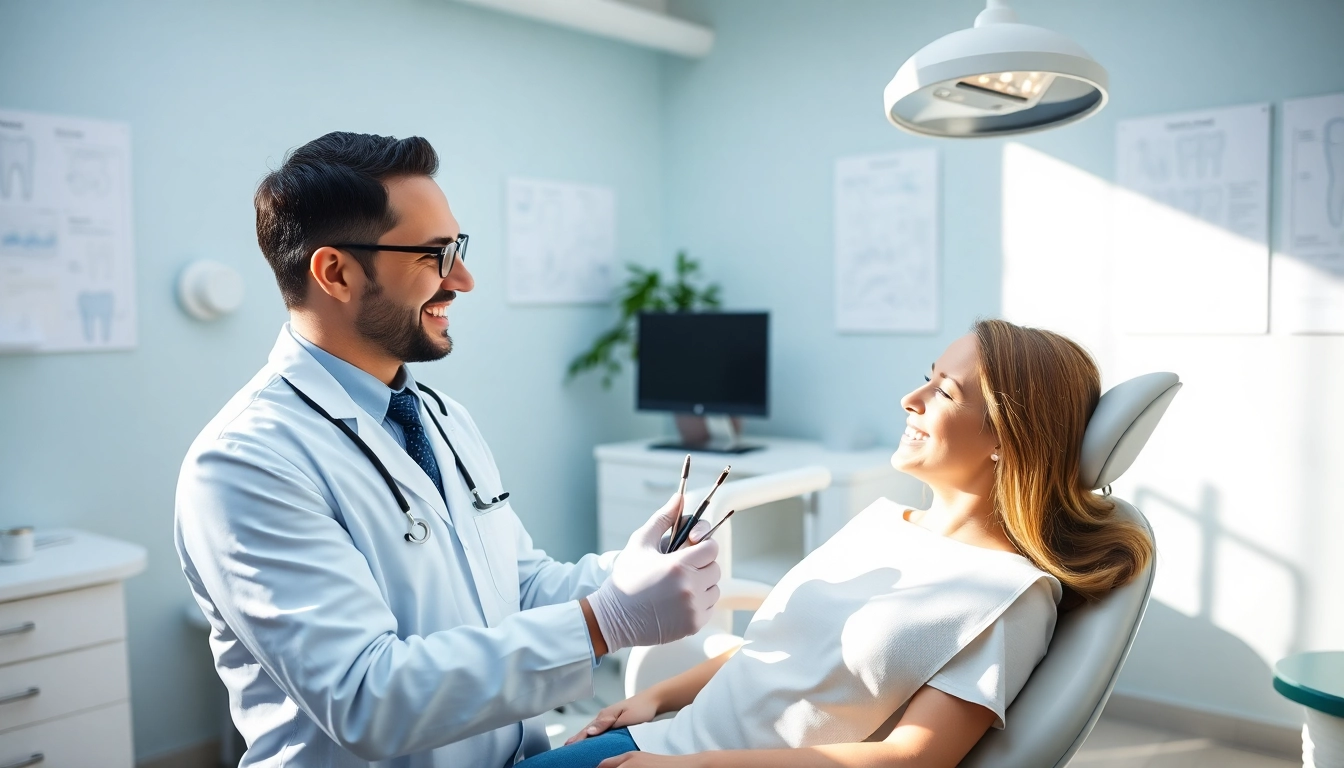Understanding the Importance of Checkups
Regular dental checkups are a cornerstone of maintaining optimal oral health. These visits, often overlooked, are essential to ensuring that any dental issues are identified early and addressed accordingly. Beyond just cleaning your teeth, checkups play a vital role in preventing more serious health complications that can arise from poor oral hygiene.
What Are Dental Checkups?
Dental checkups are regular appointments you schedule with your dentist, typically every six months, although some may require more frequent visits based on their dental health. During these appointments, a dentist or dental hygienist will perform several key tasks, including a thorough examination of your mouth, teeth, and gums, as well as professional cleaning to remove plaque and tartar buildup.
The examination often includes X-rays, oral cancer screenings, and assessments of your bite, jaw, and gums. This comprehensive check not only targets existing dental problems but also aims to prevent future issues from developing.
The Role of Checkups in Preventative Care
Preventative care is an integral part of healthcare, and dental checkups are no exception. By having regular checkups, individuals can significantly reduce their risk of severe dental conditions such as cavities, gingivitis, and periodontal disease. Dentists use these appointments to provide advice on oral hygiene practices, dietary recommendations, and lifestyle changes that can positively impact dental health.
In essence, these visits are proactive measures rather than reactive solutions to dental problems. When dental concerns are addressed promptly, the treatments are often less invasive and less costly.
Common Misconceptions About Checkups
Despite their importance, many misconceptions exist regarding dental checkups. One such myth is that if you don’t experience pain or discomfort, there’s no need for a checkup. In reality, many dental issues can arise without any immediate symptoms, leading to severe problems if left untreated.
Another common misconception is that dental checkups are merely about teeth cleaning. While cleaning is an essential part of the process, thorough examinations often reveal underlying health issues that can be crucial for your overall well-being.
Frequency and Types of Checkups
Recommended Checkup Schedule for Adults
For most adults, visiting the dentist twice a year is generally recommended. However, factors such as age, health status, lifestyle, and personal dental history may influence this frequency. Adults with a higher risk of gum disease or dental issues may need to visit more frequently—every three to four months, for example.
Checkups for Children: What to Expect
Children should have their first dental checkup by their first birthday or within six months after their first tooth erupts. As children grow, the American Academy of Pediatric Dentistry recommends regular visits every six months. These appointments help to monitor the growth of teeth, the alignment of bites, and the development of the jaw. The dentist will also assess oral habits such as thumb sucking and provide guidance on proper brushing and dietary habits.
Children’s checkups may also include fluoride treatments and dental sealants—both of which can provide added protection against cavities.
Specialized Checkups: When Are They Necessary?
Individuals with complex dental conditions—such as periodontal disease, diabetes, or those undergoing orthodontic treatment—may require specialized checkups. Specialized checkups are often tailored to address specific issues and may involve more detailed examinations and treatment plans.
Consulting with your dentist to determine the best schedule based on your unique dental health needs is crucial. By following this personalized approach, individuals can receive the targeted care necessary for optimal oral health.
The Benefits of Regular Checkups
Early Detection of Dental Issues
One of the most significant benefits of regular checkups is the early detection of dental issues. Conditions such as cavities, gum disease, and oral cancer can develop silently. Routine checkups allow dentists to catch these issues in their early stages when they are more manageable and less costly to treat.
For instance, cavities that are detected early can often be treated with simple fillings rather than more invasive procedures like root canals or extractions, which can be considerably more expensive and uncomfortable.
Maintaining Overall Health Through Oral Care
Research has established a link between oral health and overall health. Conditions such as heart disease, diabetes, and respiratory illnesses can be exacerbated by poor dental hygiene. Regular dental checkups can help ensure that individuals maintain good oral health, positively impacting their overall health and quality of life.
Furthermore, oral health education provided during checkups empowers patients to take an active role in their dental care, fostering health-conscious behaviors that extend beyond just oral hygiene.
Financial Benefits of Preventative Checkups
While some may perceive the cost of dental checkups as an unnecessary expense, the reality is that preventative care saves money in the long run. Regular checkups can help avert complex procedures, emergency visits, and hospitalizations resulting from untreated dental conditions. According to studies, the cost of preventive dental care is significantly lower than that of restorative or emergency treatments.
Investing in routine examinations not only preserves your health but also contributes to improved financial well-being by minimizing unforeseen dental issues down the road.
Preparing for Your Checkup
What to Do Before Your Appointment
Preparation for a dental checkup can enhance the efficiency and effectiveness of your visit. Start by compiling your medical history, medications you are currently taking, and any concerns you may have about your oral health. This information will help your dentist provide tailored advice and treatment options.
It’s also beneficial to practice good oral hygiene in the days leading up to your appointment. Brushing and flossing regularly helps maintain overall oral health and can provide your dentist with the best insight into your dental habits.
Questions to Ask During Your Checkup
Your dental checkup is an excellent opportunity to engage with your dentist about your oral health. Consider asking questions such as:
- What can I do to improve my oral health?
- Are there any signs of dental issues in my mouth?
- How can my diet affect my oral health?
- What are the latest treatments available for my specific dental concerns?
Don’t hesitate to express any concerns or worries you might have about procedures or treatments. Open communication with your dentist fosters trust and can lead to better health outcomes.
Post-Checkup Care: Following Up on Recommendations
After your checkup, your dentist may provide specific recommendations for improving or maintaining your oral hygiene. This could include changing your brushing technique, scheduling a follow-up visit for necessary treatments, or implementing dietary changes. Following these recommendations is crucial to enhancing your oral health and preventing future problems.
In addition, if you receive any dental treatments during your checkup, ensure to adhere to any post-care instructions provided by your dentist to promote healing and avoid complications.
Choosing the Right Dental Care Provider
What to Look for in a Dentist
Selecting a dentist is a personal choice and could significantly affect your experience during checkups. Look for a dentist who is qualified, has a good rapport with patients, and maintains a clean, welcoming office environment. If anxiety around dental visits is a concern, seek out practitioners who specialize in managing dental anxiety.
It’s helpful to consider a dentist’s availability, the range of services offered, insurance compatibility, and whether they have facilities for specialized care should you need it.
Reading Reviews and Recommendations for Dental Checkups
Before settling on a dental care provider, investigate their reputation through online reviews, testimonials, and recommendations from family and friends. Such information can offer insights into other patients’ experiences, which can be valuable in finding the right match for your needs.
Furthermore, many healthcare review platforms allow users to rate their dentists based on various criteria, providing hands-on insights that can guide your choice.
Leveraging Technology for Enhanced Checkup Experiences
Advancements in dental technology can dramatically change the checkup experience for the better. Modern offices may utilize tools such as digital X-rays, intraoral cameras, and computer-aided design (CAD) for restorative work. These technologies not only improve the accuracy and efficiency of assessments but also increase patient comfort and understanding.
Consider asking your dentist about the technology they use during checkups and how it can enhance your dental care experience. An informed patient is often a more satisfied patient.



